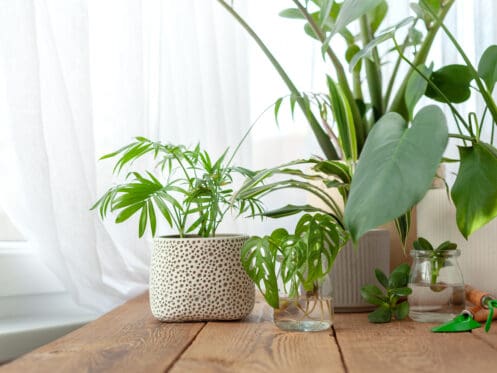You probably know all about the dangers of outdoor air pollution in Metuchen, NJ. Did you know that, according to the EPA, 96% of homes in North America have problems with indoor air quality? Dust, chemical vapors, pet dander, and other pollutants become trapped in homes that are tightly closed up to retain warmth or cool air. Bacteria, viruses, and mold spores lurking in the air can cause illnesses and aggravate asthma and allergies.
Fortunately, you have several options to improve your indoor air quality, from simple methods to high-tech devices. One natural way is to place a few indoor plants around the home. Here’s a list of the best plants to help clean the air in your home.
Snake Plant
Snake plant (Sansevieria trifasciata), also known as mother-in-law tongue, helps purify the air in your home. It’s also low-maintenance and perfect for busy people, frequent travelers, and anyone who doesn’t have a “green thumb.” It requires low to bright indirect sunlight, a room temperature between 65 and 75 degrees Fahrenheit, and low humidity.
Keep in mind that snake plants are mildly toxic to pets when ingested.
Spider Plant
The popular spider plant (Chlorophytum comosum) has been found to eliminate carbon monoxide and volatile organic compounds (VOCs) in indoor air. It’s non-toxic to humans and pets and low-maintenance. It requires medium to bright indirect sunlight, consistently moist soil, temperatures of 65 to 75 degrees Fahrenheit, and average humidity.
Because of the way they grow, spider plants look their best as hanging plants, but they can also be placed on shelves.
Peace Lily
According to a NASA study, the peace lily is one of the best air-purifying plants. They have the ability to remove several chemicals from the indoor air. It’s also an easy plant to care for. Keep its soil evenly moist and provide it with medium-to-bright indirect sunlight. It also thrives in stable, average temperatures with average humidity.
Peace lilies grow luscious and tall when placed on the floor or a table. Be aware that it is toxic to humans and pets if ingested.
Golden Pothos
The Golden Pothos (Epipremnum aureum) species removes formaldehyde, benzene, and other chemicals from your indoor air. A household contaminant, formaldehyde, is used to produce common items found in the home, such as plywood, paper, and cosmetics. Benzene is a solvent used in pharmaceuticals and various construction and household chemicals.
Golden pothos is an attractive plant with shiny, variegated leaves. It does best in average temperatures and humidity. You should let it dry out before watering. Note that it is toxic to both people and pets if ingested.
Other Ways to Improve Your Indoor Air
Plants can do a lot to clean up your indoor air, but there are other options that can further protect you and your family. Take a professional approach to indoor air quality problems with these high-tech solutions:
Humidifiers and Dehumidifiers
High humidity can make a room feel cooler or warmer, but dry air can irritate your sinuses and worsen respiratory problems like asthma. Your skin may also suffer, becoming dry and itchy. When the level of moisture in your home is too high, the air becomes a breeding ground for dust mites, mold, and other irritants. The answer is to find a balance of indoor humidity that everyone in the household feels comfortable with. It’s recommended by the EPA that a home maintain a humidity level between 30% and 50%.
Balance out the humidity in your home with a humidifier or dehumidifier. While a portable unit works, its range is limited to the space it is in. The solution is to have a professional add a whole-home humidifier or dehumidifier to your home’s HVAC system. It will work along with your heating and cooling system to control the humidity throughout your entire home.
Now, with the push of a button, you can control the humidity in your whole house to alleviate the symptoms of dry air and maintain a comfortable temperature at the same time.
Air Cleaners and Purifiers
Technology has revolutionized the cleaner air industry. These products range from budget-friendly portable air cleaners to expensive electrostatic air cleaners that connect to your HVAC system.
An air purification system will keep household members healthier by removing and destroying chemical vapors that cause symptoms like headaches, nausea, fatigue, dizziness, or even a more serious condition. Most air cleaners can trap organisms as small as the common cold virus, giving them the ability to eliminate several harmful pathogens. Air purifiers are available that can kill pathogens immediately on contact, providing you with the highest degree of protection possible.
A professional HVAC technician can evaluate your current indoor air situation and make recommendations for you.
Ventilators and Air Filters
A tightly sealed home is a good thing. It means you have no leaks for hot or cold air to escape through. However, fresh air is necessary for good health. If your home is poorly ventilated, your health may suffer. One way to introduce fresh air into a room is by simply opening a window, but open windows aren’t practical when it’s hot or cold outdoors.
The solution to having fresh air throughout your home is to add a ventilator to your HVAC system. This whole-home solution regularly exhausts out stale air and brings in fresh air. A whole home ventilator runs so quietly you won’t even know it’s on. If you suffer from allergies, have been having headaches, sinus problems, or itchy skin, you’ll notice your symptoms improving quite quickly.
An HVAC professional can help you choose the right ventilator for your home. Some ventilators even help lower energy costs since they use the outgoing air’s energy to heat or cool the incoming air. Circulating the air in your home can also reduce the amount of time that you need to run your HVAC system.
Your home’s clean air depends on using a good-quality filter for your HVAC system. Many homeowners choose disposable filters, which usually need to be replaced every 30 to 90 days. You can choose between different varieties based on the size of the particulates that you want to remove. Reusable filters are also an option. In many cases, this product is more efficient at trapping dust, pollen, and bacteria from your indoor air.
Consult an HVAC expert to help you choose the right air filter for your home and HVAC unit. Whichever product you choose, make sure to clean or change the filter at least every three months. This time frame may be more frequent if you have asthma or have pets in the home.
Improving indoor air quality is easy with so many high-quality products and options. The professionals at First Choice Plumbing, Heating & Air Conditioning in Metuchen are ready to help you find the best humidifiers, dehumidifiers, air purifiers, ventilators, and air filters for your home. We also have a team of experts to address all of your plumbing, heating, and air conditioning needs. Call to schedule an appointment with one of our air quality consultants today.




